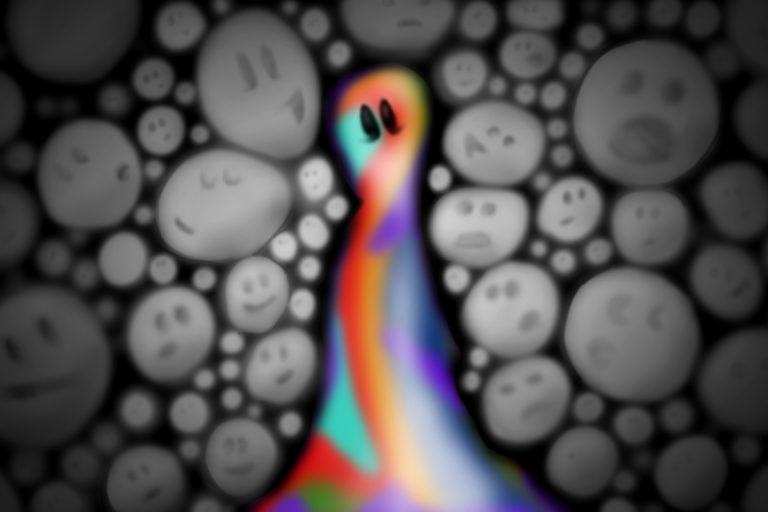When I was 13, my parents, siblings and I walked into a crowded McDonald’s restaurant and stood at the back of the lineup. It was a busy Saturday, and Mom was too tired to resist when Dad offered up the option of not cooking. My parents warned me that I’d better have figured out what I wanted to order beforehand, but I was still debating my decision. When my parents were satisfied that I’d made up my mind, our little posse shuffled to the bored lady waiting to take our order. As Dad began ordering for himself, I quickly nudged Mom.
“Um, could you?” I whispered. My mom gave me an understanding smile and gently pushed on the small of my back until I was right in front of the counter. My mouth went dry. What had I wanted to order? My pre-rehearsed lines had been mysteriously erased from my nervous brain, and nothing came out of my mouth. I quickly looked to Mom, who smiled encouragingly and dropped her hand from my back. The woman looked up at me expectantly. My cheeks immediately grew warm, and I stuttered, grasping for the right words.
This is what scientists call a sign of anxiety or shyness. While I’ve never thought of myself as a naturally anxious person, the above scenario played out many times between my still-no-growth-spurt elementary and preteen age and the preconceived I-can-do-everything-myself stage that occurs in every adolescent’s life. I would quietly ask my parents to call to make appointments, and my friends would reluctantly ask the teacher to clarify the due dates of an assignment so I wouldn’t have to raise my hand. Of course, growing up meant I had to order my own food, book my own appointments, and chase strangers down for more information despite my nervous disposition. But as I overcame each of these situations, I soon learned that I was not the only person who struggled with accomplishing these seemingly simple tasks. While I may have been shy when I was younger, there was another explanation that many other people could relate to. I was quite simply an introvert, and this explained why there was one thing I still tried to avoid at all costs, despite how hard I worked to be comfortable with it. I describe it as the excruciatingly painful social procedure human beings call small talk.
I cannot speak for all introverts, but there is nothing I hate more than running into someone I vaguely know and have to engage in false niceties and prewritten scripts of “I’m good, how are you?” I am always forced to recall whatever recent life event has happened in their life while wishing I could walk away without being deemed rude or impolite. Now, don’t get me wrong─ I love the people I meet in the grocery store or at some social event. I care about their family issues and recent promotions at their jobs, but this is a real struggle for me. Aside from having to repeat the exact same sentences, I struggle not with pretending I am interested in their lives but in pretending to be interesting to myself and others.
I am the kind of person to rehearse what I am going to say before engaging in polite conversation, whether it’s memorizing what my now-adult brother is doing with his life or whether my mother likes her new job. These simple facts are lined up on the tip of my tongue when that sweet elderly lady from church taps on my shoulder and gives me a toothy smile. I seem to have perfected the art of answering questions and making my listener believe that I have a life account worth listening to. Unfortunately, once those questions have passed through and I have delivered every word promptly and genuinely, awkwardness settles into the silence. That feeling I am acutely aware of is something everyone tries to avoid, unless they are oblivious to the obvious lag in the conversation, but at this point I become at a loss for providing the empty space with some intelligent or witty comment. A familiar voice in my head examines and criticizes every thought and idea and topic, throwing most into the virtual trash bin of my mind until I am resorted to mentioning the state of the weather or making a lame excuse to run to the bathroom. This is the moment when I look up to the sky and desperately wish for someone I am more comfortable with to appear from a puff of smoke and rescue me from having to carry the conversation. That, or that I could remove myself from the situation in the same fashion, shrinking and curling up into the air like steam, leaving my unassuming acquaintance bewildered and confused.
Throughout all this anxiety over a few simple words, there are times when a socially anxious person has the glorious opportunity to encounter a god or goddess of small talk. The experienced veterans I speak of are well-versed in the trade of summing up the highlights of their lives and tactfully asking others about theirs to keep the conversation afloat. These people smile graciously and ignore my stuttering, feeble attempts of making conversation, and either excuse themselves so I can escape or assume the leader-of-discussion role I desperately avoid.
Amid the tremendous relief that floods my body, all I am required to do is nod and “uh huh” at whatever they are saying while mentally praising their existence. It doesn’t even matter what they are talking about anymore; what matters is they have compensated for my lack of skill for their field of expertise and thus rescued me from an otherwise painful experience. These conversation angels have either learnt the tricks of the trade or were born with the natural ability to speak with confidence and are completely ignorant of my discomfort, but either one makes no difference to me.
Unfortunately, this is a rare and unique phenomenon that cannot be wished upon and expected to come true. So, when invited to continue engaging in social normalities, a reserved introvert such as myself is now under unrelenting pressure to form thoughtful, well constructed sentences that interest their listener. This kind of situation often led me to avoid frequent contact with people I didn’t know well, but it didn’t help that I lived in a relatively small community full of people that I grew up with but never actually talked to or who had some connection with my parents. My parents built friendships and my extended family populated the area until there were no more stores or restaurants I could walk into without running into someone who recognized me. If this is not the case for you, then I’m sure you can recall an awkward family reunion. Being bombarded with long hugs and “I knew you when you were a baby! Look at how you’ve grown!” brings a lot of anxiety and nervousness to someone who’d much rather be at home. How does one respond to such people, anyway?
There is a great downside to being naturally uncomfortable in social situations, besides what I have already illustrated, which is the false belief that introverts hate talking. This has never been farther than the truth. As two introverted adults with extremely opposite interests and personalities, my parents found that lengthy discussions were the only things they enjoyed doing together. With nothing in common, but having a successful marriage and three children, my parents often go on regular coffee outings for an opportunity to be in each other’s company and catch up. They are but one example of very introverted people enjoying themselves in conversations, which, funnily enough, is not a contradiction. What most extroverts don’t understand is that introverts don’t hate talking; we hate the shallow and scripted words exchanged between awkward acquaintances. It might as well be called torture. But because small talk is considered a standard practice in our society, I have been forced to survive through awkward moments and social gatherings with my limited knowledge and fickle mind. However, I live for the occasional day where I can enjoy rich, intelligent conversations with topics that I know inside and out, with the people I know and love.

